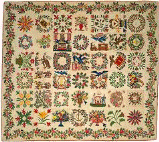Textile Society of America

Textile Society of America: Symposium Proceedings
Date of this Version
1994
Document Type
Article
Citation
Aronson, Lisa. “Akwete-Igbo Weavers as Entrepreneurs and Innovators at the Turn of the Century.” Contact, Crossover, Continuity: Proceedings of the Fourth Biennial Symposium of the Textile Society of America, September 22–24, 1994 (Los Angeles, CA: Textile Society of America, Inc., 1995), pp. 31–37.
Abstract
In his discourse on trade commodities, Igor Kopytoff argues that commodities assume what he calls a "cultural biography" through which one sees "the social system and the collective understanding on which it rests" (Kopytoff, 1986:89). What Kopytoff means by this is that commodities take on a life of their own based on the social and economic factors that have come to affect them. This paper will address the "cultural biography" of cloth in Southeastern Nigeria from its origins through trade to its various levels of assimilation both in use and production.
The biography discussed in this paper reaches an important high point in the late nineteenth century when weaving in the Igbo village of Akwete underwent significant changes. Weavers in this southeastern Nigerian village widened their cloths and began to use factory-produced threads and elaborate weft-float designs traceable to foreign sources. Already by 1915, the ethnographer P. A. Talbot had acknowledged this change when he wrote that Akwete cloth was once a simple-woven cloth used as bath towels but was now becoming more elaborate in design and was worn for occasions of ceremony. (Talbot, 1968:287).
Included in
Art and Materials Conservation Commons, Art Practice Commons, Fashion Design Commons, Fiber, Textile, and Weaving Arts Commons, Fine Arts Commons, Museum Studies Commons


Comments
Copyright © 1994 Lisa Aronson